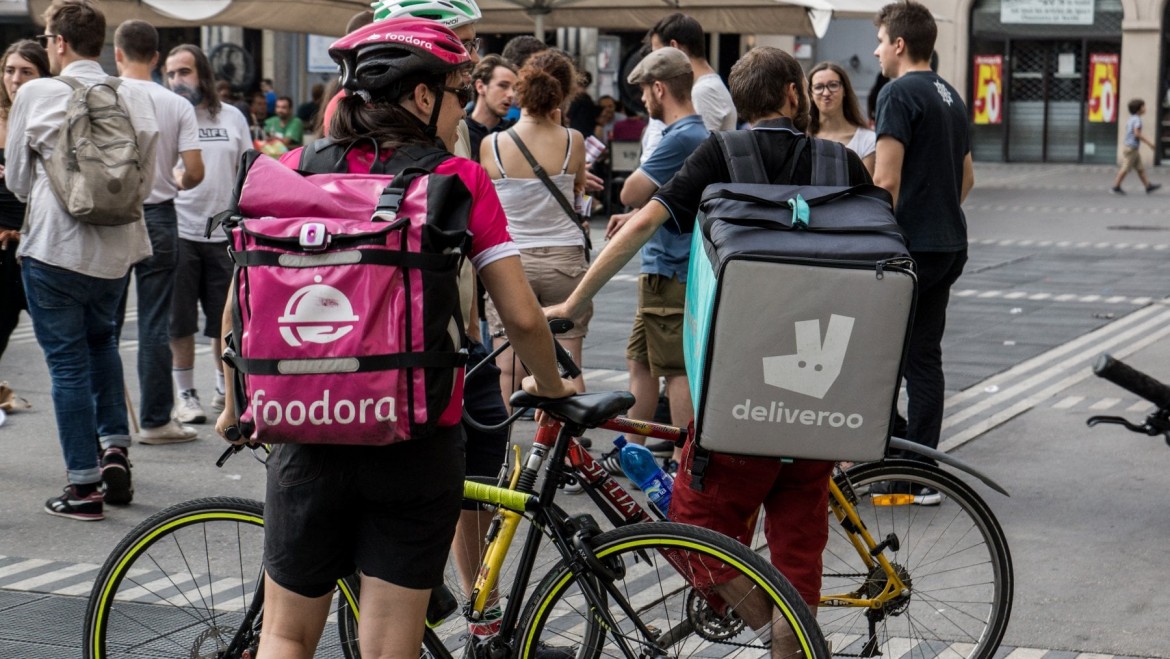Report
Foodora loses on appeal, delivery workers’ rights recognized – to a point
A multinational corporation on trial: the six former delivery workers won the recognition of their rights under the Italian collective contract for the delivery sector. But they didn’t get their jobs back.

The initial appeals ruling in the so-called “Foodora trial” was partially overturned on Friday by the Court of Appeals of Turin.
In March, a court had rejected the initial appeal by five former delivery workers who had sued over their impromptu firing by Foodora, a decision taken by the company after the 2016 protests, where the workers had demanded fairer pay and recognition of legal status and benefits. The initial ruling said that the petitioners had not been employees of Foodora but had been self-employed, and that this allowed the multinational food distribution company to terminate the employment relationship with them at any time it chose.
On Friday, the higher-level appeals court overturned that ruling, explicitly arguing that the “riders” had a right to economic equality with all the other employees of the logistics sector, which accordingly entitled them to a year-end bonus (the “thirteenth salary”), paid vacations and sick leave. The Milan court recognized “the right of the appellants to receive the compensation they are entitled to in connection to the work activities they actually undertook for Foodora, on the basis of the level of direct, indirect and deferred remuneration established for the employees classed at the fifth level in the collective contract for the transport-logistics sector, minus the compensation they have already received.”
On the other hand, the court rejected their request to be reinstated in their former jobs at Foodora. We will have to wait for the publishing of the full court ruling, including the motivation for the decision, to understand the reasoning behind it. The court also rejected their requests for additional compensation on account of privacy violations due to the apps they had to install, used by the company to organize the work assignments for deliveries. Furthermore, the court ordered that a third of the legal costs—which, between the first and second appeal, will amount to just under 30,000 euro—will have to be supported by the five ex-employees.
For the first time in Italy, a multinational company of the gig economy has been ordered by a court to pay its delivery workers the salary set out for regular employees at the fifth level of the national collective contract for the logistics sector, and also pay the corresponding social security contributions.
Giulia Druetta and Sergio Bonetto, the two lawyers who fought for the ex-workers’ rights in the Foodora trial—which is in many ways a bellwether for Italy as a whole—have said that they were satisfied, at least in part, with the verdict. After it was announced, Giulia Druetta said: “From now on, in Italy, all delivery persons working for the food delivery multinationals are entitled to a fair wage, to paid sick leave and to the year-end bonus: this is an important recovery of decency, in the historical context of an undeniable attack on workers’ rights, which has been going on for decades. But we would still like to understand why they were denied full reinstatement in their previous jobs.”
“It is not the first such ruling in Europe, but it is a further step towards containing the excessive power that these multinational corporations have. All the more, we need a further political and legislative step forward, which would ensure an increase in controls and provide new legal instruments which would be both effective and progressive,” the young lawyer from Turin added.
Marco Grimaldi, the head of the LeU group in the regional council of Piedmont, said: “This is a first ruling against digital servitude, a victory for the many who have been pointing out in recent years that these are not just side gigs, but real work. It is a first step that will be a starting point for many other battles. The current government should take a hint from this ruling and abandon its indifference: these forms of digital servitude must be curtailed, because such irregular work still represents real jobs, which should be framed within the national collective contracts. There is no option to remain neutral on this issue—and this ruling proves it.”
Originally published at https://ilmanifesto.it/foodora-condannata-sentenza-ribaltata-a-meta/ on 2019-01-12
